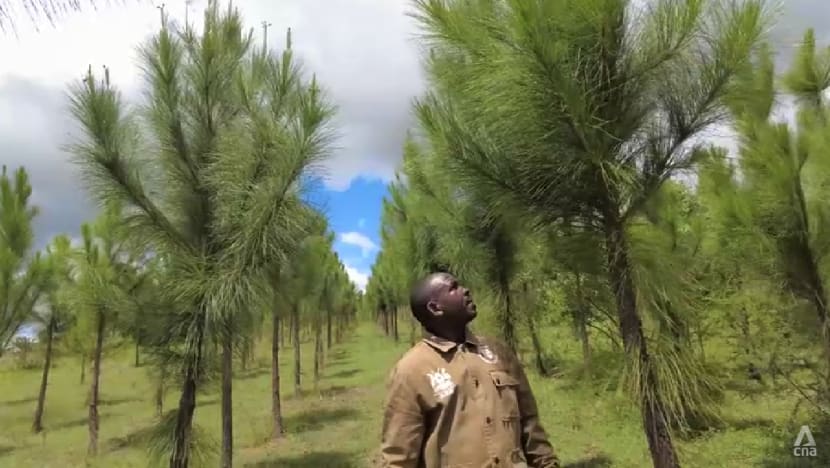Uganda seeks to rebuild forests as country's refugee settlements impact environment
Refugee settlements are heavily dependent on wood for fuel and construction, which has contributed to Uganda's deforestation problem.

A community initiative in Uganda is working to reverse the environmental damage left by refugee settlements. The United Nations-supported campaign is focused on planting new trees to replace those that have been cut down.

This audio is generated by an AI tool.
NAKIVALE, Western Uganda: A community initiative in Uganda is working to reverse the environmental damage left by refugee settlements.
The United Nations-supported campaign is focused on planting new trees to replace those that have been cut down.
This comes as refugee settlements are heavily dependent on wood for fuel and construction, which has contributed to Uganda's deforestation problem.
The landlocked country hosts Africa's largest refugee population, which now stands at 1.4 million. That number is expected to grow, straining local resources and the environment.
REPLANTING TREES
Former tailor Enoch Twagirayesu arrived in Uganda in 2005 after fleeing violence in Burundi and went to the country's oldest refugee settlement Nakivale. Then, the settlement still had abundant tree cover.
However, more refugees have meant even greater pressure on resources, as they largely rely on the environment for their livelihoods.
Mr Twagirayesu is working to improve the situation.
He is leading a campaign to re-green Nakivale, working with more than 350 members to help save the environment. In the past six years, they have planted over 30,000 trees.
“Our dream was to see Nakivale green again in 10 years. And when I look at these trees looking good, I feel our dream is coming true,” said Mr Twagirayesu, chairman of the Nakivale Green Environment.
However, a host of challenges remains with the constant influx of refugees and the need for wood.
The destruction of trees has negatively impacted on the environment, disrupting rainfall patterns.
“There are areas in Nakivale where we have planted trees, but Nakivale is extremely hot sometimes,” said Mr Twagirayesu.
“And because the water source is very far away, we can’t even water the trees and they end up dying.”
SUPPORTING GREENING CAMPAIGNS
Since 2009, the UN High Commission for Refugees (UNHCR) has been rebuilding forests in all refugee settlements in Uganda.
The UN-funded Nsamizi Training Institute in Nakivale supports refugee-led greening campaigns, providing seedlings, training and financial assistance.
The refugees plant a variety of tree species. These include acacia, which provides a steady source of firewood, pine trees, whose wood can be used for construction, and fruit trees, which can provide food.
“In the long run, we don’t know what's coming to us. What if there are floods? What will happen?” said Nsamizi Training Institute environment officer Rachel Akamumpa.
“So it's better for us to plant the trees and increase tree count within the settlement.”
Trainers from the institute also teach refugees how to make energy-efficient stoves, reducing their need for firewood.
In 2022, more than 5,000 cookstoves were distributed to refugee communities.
For Congolese refugee Mukakagina Adereni, who arrived with her family a few months ago, using one of these stoves has allowed her to spend less time and fuel when cooking food.
“We used a lot more firewood before we were introduced to these new stoves,” she said.
“The traditional three-stone stove consumed three times more than this one.”
In the last two decades, Uganda has lost 13 per cent of its tree cover to deforestation.
The UNHCR said it hopes to protect the environment in a sustainable way, while providing the basic needs of refugees.
















